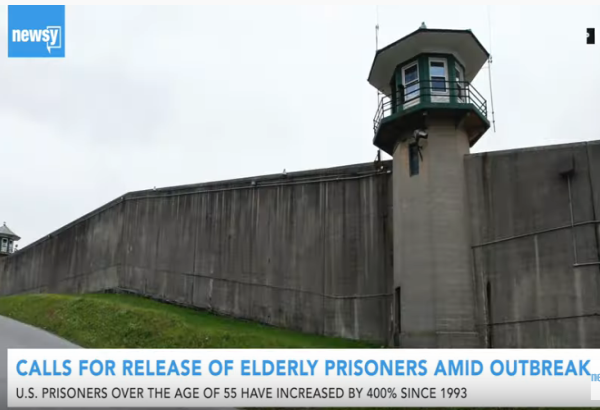[COVID-19\Prisons]
Karakatsanis – who has won the release of tens of thousands of incarcerated people through impact litigation – is highlighting the COVID-19 crisis as especially urgent for the 2.3 million people behind bars across the United States.
Photo: YouTube
How will the millions in America’s prisons, and jails, fare during COVID-19 outbreak?
Former public defender and civil rights lawyer Alec Karakatsanis – one of the leaders in the national movement to end money bail and rethink the criminal legal system – is sounding the alarm about the emerging COVID-19 health crisis in the prison system.
Unless protective measures are put into place, the situation could quickly develop into a dire emergency among the nation’s incarcerated people.
In the midst of a public health emergency that’s unprecedented for our lifetime, Karakatsanis – who has won the release of tens of thousands of incarcerated people through impact litigation – is highlighting the COVID-19 crisis as especially urgent for the 2.3 million people behind bars across the United States.
Even under normal circumstances, jails are inherently dangerous and unhealthy places. Overcrowding, deplorable conditions, and inadequate access to healthcare make jails a hotbed for infectious diseases. Add to this the fact that jails and prisons are home to a large number of people with untreated medical issues, people who have chronic illnesses such as diabetes or asthma, those who are formerly homeless, and those who are immunocompromised – and the danger level increases exponentially.
“A global pandemic will send these facilities spiraling into an abyss of contagion,” Karakatsanis warns. “Even though testing has been inconsistently available to those who need it most, several people jailed in facilities across the United States have already tested positive for COVID-19. Based on everything we’ve learned thus far, this virus will continue to spread in jails and prisons – and the consequences will be devastating.”
From a wildfire spread of the virus throughout the population of individuals behind bars, as well as infections of staff who are working in the facilities and then going out into the general population, where they are shopping in grocery stores, taking public transit, and then going home to their families – Karakatsanis predicts that the results of failing to act now could be catastrophic.
One way to lessen the impact within the nation’s criminal legal system is to immediately release all individuals being held pretrial without any current convictions. This would ease the overcrowding of the system and lessen these individuals’ chances of contracting the illness. The release of people detained pretrial has been initiated in a growing number of places, including Louisville, Los Angeles, Charlotte, and central Alabama.
As the founder of Civil Rights Corps, Karakatsanis has spent his career advocating for racial justice and the civil rights of poor and vulnerable people. Before founding Civil Rights Corps, he served as a civil rights lawyer and public defender with the Litigation Division of the Public Defender Service for the District of Columbia and a federal public defender in Alabama, representing impoverished people accused of federal crimes. Karakatsanis was named the 2016 Trial Lawyer of the Year by Public Justice and was awarded the Stephen B. Bright Award for contribution to indigent defense in the South by Gideon’s Promise.
Karakatsanis is the author of Usual Cruelty: The Complicity of Lawyers in the Criminal Injustice System (The New Press), a book that serves as a profound indictment of the bureaucracy that our society has created to put 2.3 million human beings in cages throughout the U.S. All royalties from the sale of Usual Cruelty (which can be found anywhere books are sold) are donated to charity.






